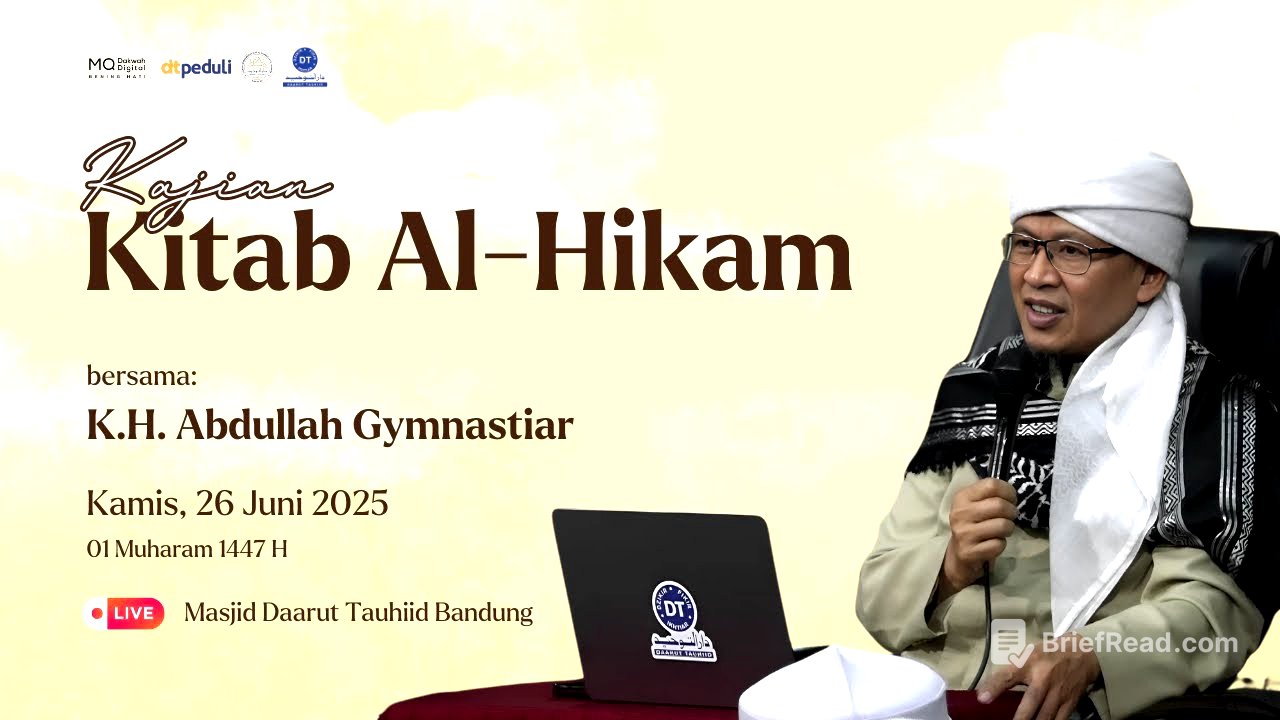TLDR;
This video features a lecture and Q&A session focusing on the importance of remembering Allah (dhikr) in daily life and understanding His presence in all aspects of existence. It addresses common issues such as forgetfulness, lack of sincerity, and being deceived by worldly recognition. The lecture emphasizes that knowing Allah is the key to a meaningful life and offers practical advice on how to cultivate a constant awareness of Him.
- The core problem in life is a lack of dhikr (remembrance of Allah) due to not knowing God enough.
- Sincerity is the hardest test, as is avoiding being consumed by the recognition of creatures over God's recognition.
- The most dangerous thing is when the heart becomes happy with the recognition of creatures and feels proud that this is the result of one's own hard work.
Introduction and Initial Interactions [0:00]
The video begins with the speaker greeting the audience and expressing gratitude. There's a brief moment of confusion as the speaker looks for his desk, which has been moved. He jokingly scolds the students for playing around and asks them to make space for others. The speaker eventually finds a suitable table and expresses relief.
Opening Prayer and Reflection on Allah's Presence [3:42]
The speaker starts with an opening prayer, praising Allah and seeking His blessings for the gathering. He emphasizes Allah's all-seeing nature and questions whether anything can escape His sight, hearing, or grasp. He stresses the importance of believing that Allah knows everything and that such a belief would make people beloved and chosen by Him.
The Essence of Life Problems and Dhikrullah [7:27]
The speaker explains that life's problems should lead people to dhikrullah (remembrance of Allah). He quotes a verse stating that humans and jinn were created to worship Allah, which begins with knowing Him. He contrasts those who remember Allah with those who don't, likening it to the difference between the living and the dead. The core problem is thinking too much and not remembering Allah enough, and the right approach is to make every thought a form of dhikr.
Sincerity and Avoiding Neglect of Allah [11:13]
The speaker cautions against performing good deeds for worldly recognition, using the example of a mujahid (one who fights in the way of Allah) whose actions are motivated by a desire to be called brave. He stresses that Allah knows the intentions of the heart and that neglecting to pray to Allah is a problem, even if one outwardly professes faith. He emphasizes the need to increase dhikr from a physical act to a genuine belief in the heart.
Verses on Allah's Knowledge and Presence [13:17]
The speaker quotes verses from the Quran emphasizing that nothing is hidden from Allah, whether on earth or in the heavens, and that Allah is with people wherever they are. He explains that holding onto these verses can prevent sinful acts and eliminate feelings of loneliness, as one will always feel Allah's presence.
Explanation of Al-Hikam Number 8 [14:53]
The speaker explains a passage from the Book of al-Hikam, stating that if Allah opens a way for someone to gain wisdom, they should not focus on their own meager deeds. He emphasizes that knowledge of Allah (makrifat) is a gift from Allah, while deeds are a gift from the individual. He notes that sometimes a servant with simple deeds can know Allah because Allah has opened their heart, possibly due to prayers from parents or teachers, or because the person sincerely asks Allah for faith.
The Source of Life's Problems: Lack of Dhikr and Knowledge of God [18:36]
The speaker identifies the real source of problems in life as a lack of dhikr, which stems from not knowing God enough. He advises against judging others and encourages finding excuses for their behavior. He illustrates how remembering Allah can transform one's perspective, using examples such as intending to see Japanese products and being reminded of Japan, or intending to see what God has made and being unable to stop remembering Allah.
Dhikr in Daily Life and Recognizing Allah's Creation [22:58]
The speaker encourages incorporating dhikr into daily life by recognizing Allah's creation in everything one sees. He suggests that when seeing leaders or those in power, one should remember that Allah has given them their positions and that they will be held accountable. He emphasizes that during times of change or difficulty, those who do dhikr remain calm because they believe Allah is in control.
The Story of an Indian Billionaire and the Power of Allah [25:30]
The speaker shares the story of a wealthy Indian billionaire who died after being stung by a bee, highlighting the power of Allah and the insignificance of worldly possessions. He emphasizes that if one remembers Allah, they understand that bees are simply on duty and that everything is from Allah.
The Importance of Seeking Knowledge of Allah [27:20]
The speaker urges the audience to prioritize seeking knowledge of Allah over other worldly pursuits. He questions how much time people spend asking and learning about their God. He asserts that the ability to stop committing sinful acts comes from fear of Allah, and sincerity in doing good deeds comes from believing that Allah is always listening.
Gratitude, Patience, and Accepting Fate [28:31]
The speaker explains that gratitude leads to increased pleasure and that impatience stems from a lack of faith. He emphasizes the importance of accepting fate and believing that everything is measured by Allah. He urges the audience to spend time and effort to open their hearts to know and believe in Allah, rather than being consumed by worldly concerns.
Creatures as Allah's Path and the Nature of Tests [29:57]
The speaker describes creatures (wife, husband, children) as Allah's path and explains that both blessings and disasters are tests from Allah. He notes that praise and insults are tools from Allah and that the goal is to use them to draw closer to Him. He concludes that the prayer of the faithful is the best and that all their affairs are well.
Introduction of Guests and Gratitude for the Islamic Boarding School [31:51]
The speaker introduces and thanks the guests for their presence. He expresses gratitude for the Islamic boarding school, stating that it was written in the Lauh Mahfud (the preserved tablet) before they were created. He acknowledges the tough tests involved in running the school and asks for prayers.
Following Destiny and Addressing Shortcomings [34:52]
The speaker emphasizes the need to study extraordinarily to follow destiny. He states that anything good comes from Allah, and any shortcomings are a field of charity for others to help fix. He mentions that the school studies the book Al-Hikam every Thursday and Asmaul Husna every Friday night.
The Role of Students and the Pursuit of Success in the Afterlife [36:27]
The speaker acknowledges the 1400 students who serve at the school and expresses hope that they will attain a higher position in the afterlife. He emphasizes that true success lies in entering heaven and that worldly success is unclear.
Q&A Session: Helping at a Cafe [37:45]
A student named Aulia asks whether helping his uncle at a cafe is the best practice. The speaker responds affirmatively, stating that it is permissible to help one's uncle.
Q&A Session: A Mother's Gratitude and Lingering Sadness [40:12]
A mother named Naning shares her experience of losing her 16-year-old son, Alif. She expresses gratitude for being able to care for him until his death but questions why she can no longer find the same feeling of gratitude and is now often sad.
Advice on Dealing with Grief and Remembering Allah [44:50]
The speaker commends the mother's attitude and reminds her that separation can happen at any time. He explains that disasters come with Allah's permission and that belief in Allah guides the heart. He advises her to quickly return to Allah (CBY: Cepat Balik Ya Allah), mention Allah's name as much as possible, and believe in Allah. He identifies the source of problems as being late in returning to God (TJR: Telat Kembali ke Allah), rarely remembering Allah, and being doubtful.
Advice for Islamic Relief Indonesia [49:17]
Ustaz Mulyadi and his parents, Professor Muhammad, and Mr. Abdullah Hamahua, seek advice on how to remain trustworthy and carry out their mandate to provide assistance to 100 Palestinian orphans. The speaker reads information about Islamic Relief Indonesia, emphasizing its security and reputation.
The Importance of Sincerity and Avoiding Pride [55:58]
The speaker emphasizes the importance of sincerity and warns against enjoying the recognition of creatures over God's recognition. He explains that praise and abuse are both moved by God but that praise is a greater test. He shares the experience of Darut Tauhid, noting that the worst time was when it was popular because the tauhid (belief in the oneness of God) was damaged.
The Danger of Comfort and the Importance of Studying the Science of the Heart [1:01:17]
The speaker warns against the dangers of comfort, praise, and recognition, stating that they can reduce monotheism. He emphasizes that the heart can become happy with the recognition of creatures and proud of its own hard work, leading to arrogance. He stresses the importance of studying the science of the heart to avoid these pitfalls.
Closing Prayer and Reflections [1:03:41]
The speaker leads a closing prayer, asking Allah for forgiveness, guidance, and protection from heart disease. He prays for a sincere heart that can never forget Allah and asks for love of Allah and those who love Him. He prays for a good ending and a comfortable grave.
Final Remarks and Gratitude [1:09:57]
The speaker concludes by reminding the audience that even though they cannot see God, God is seeing them. He thanks the guests and apologizes for any limitations.
MQ Digital Promotion [1:12:16]
The video ends with a promotion for MQ Digital, a non-profit organization that manages the digital aspects of the event. Viewers are encouraged to donate to support their work.









